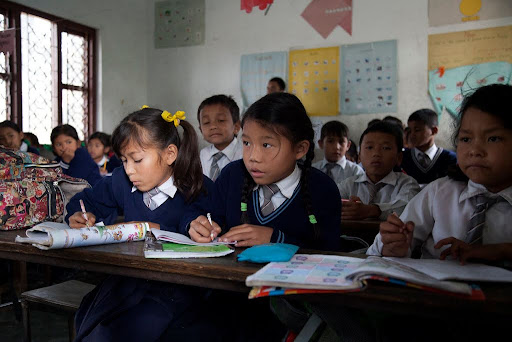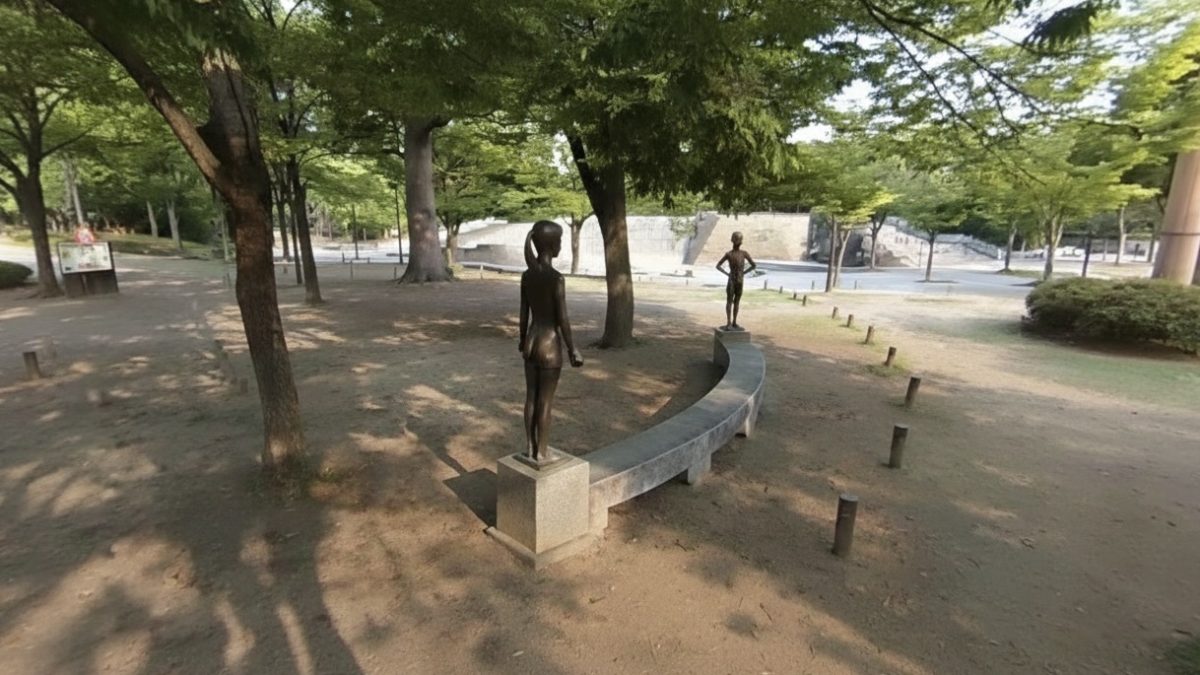We live in the twenty-first century, the most developed time in human history. Yet, there are still an estimated 500 million women worldwide struggling with the lack of access to menstrual products and adequate facilities for menstrual hygiene management, according to The World Bank. This health dilemma, known as period poverty, is a social and health condition described by the National Library of Medicine as “insufficient access to menstrual products, education, and sanitation facilities.” Under these conditions, women have no other choice but to rely on poor menstrual hygiene practices that can pose serious health consequences. This includes urinary tract infections, a result of bacteria built up due to the infrequent changes of menstrual products, and can lead to future infertility and birth complications.
Not only does period poverty threaten women’s physical health, but it also threatens opportunities for young girls and women as their freedom is physically restricted. Nepal, located in South Asia, is a conservative country where many still hold an old-fashioned outlook on gender norms, and period stigma still lingers in the rural regions of the country. To this day, there are Nepali women in rural villages in Western regions who take part in Chhaupadi – a harmful ancient traditional practice that is integrated into culture and religion. During Chhaupadi, women are forced out of their homes and have to isolate themselves in huts that are hazardous. Girls and women have died from smoke inhalation in these windowless menstrual huts after trying to keep themselves warm in the cold winters. This practice is driven by a belief system that considers women and girls as “impure, unclean, and untouchable in the menstrual period or immediately following childbirth,” according to the National Library of Medicine. These centuries-old practices are still being put into practice and continue to discriminate against women.
Nepal SEEDS is an organization that was founded in 1998 by KP Kafle who works to improve social and environmental conditions throughout the country but also focuses heavily on supporting Nepali kids with their education. SEEDS works closely with schools in rural villages in Nepal and helps students enroll and stay in school by running lunch programs, providing clean drinking water, and providing teacher salaries to keep the schools running. During their time working in the schools, SEEDS noticed a disproportionate number of girls and boys in the classrooms, as there were far more boys in schools. One of the reasons behind this issue traces back to period poverty, a prominent issue in countries like Nepal.
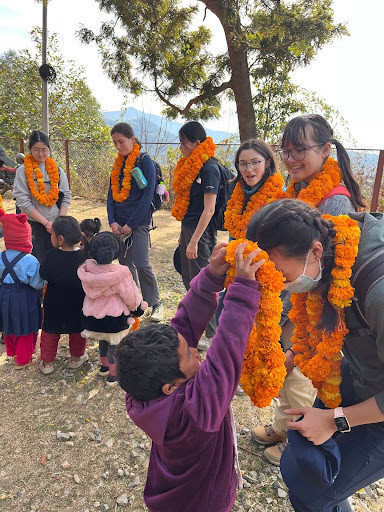
In December of 2023, eight Sacred Heart High School students had the opportunity to visit Nepal with Nepal SEEDS. During our trip to Nepal, KP Kafle, the founder of Nepal SEEDS, expressed his thoughts on practices like Chhaupadi. He explained how these harmful practices are the signs of lack of schooling and poor education. Chhaupadi exacerbates the period poverty crisis as girls are missing the opportunity to attend school during their periods as they are prohibited from leaving the huts. If these harmful practices continue, it will perpetuate a cycle of lack of education which will worsen the situation as education has the power to reduce myths and stigmas against menstruation.
However, even if women no longer have to take part in these practices, the insufficient amount of proper menstrual products available in rural Nepal is still holding women back. Girls not having access to these vital products to go on with their day limits their freedom and restricts them from attending school. Usually, they miss about a week of school for each period, and as the absence begins to add up, it really puts them behind on school work, and in some cases, girls often end up not going to school anymore. Period poverty in Nepal heavily affects girls’ education as missing school can be represented as a “girls tax” that they are obligated to pay.
As Sacred Heart is an all-girls’ school, we understand the importance of having sanitary products. However, we always have access to these products, whereas girls in Nepal have limited access to menstrual products. This issue motivated Girls Club, a club at our school whose purpose is to educate, support, and empower the ideals of feminism within and outside of the school community. As this issue was really relevant to their club’s goal, they partnered with Nepal SEEDS to contribute to the Pad Project. The goal of this project was to raise money to buy a sewing machine for Kalika High School in Nepal, where the community can make their own reusable pads.
On the Nepal SEEDS trip, I had the opportunity to visit Kalika High School and see the pad machine firsthand. The sewing machine was placed right next to a cabinet full of disposable pads. We were confused at first until one of the teachers at Kalika explained how these disposable pads are sent from the government as a form of aid. However, the girls at school prefer using the reusable pads that they make themselves, as they are customized for each girl, and most importantly, because they are reusable. Making their own pads allows them to be self-sufficient and not rely on disposable pads sent by the government. As a result, Kalika High School has now made around 300 to 400 reusable pads that are handed out to all female students and 12 female teachers. This is a major improvement as it incentivizes students and teachers to continue with their education and jobs during their periods.
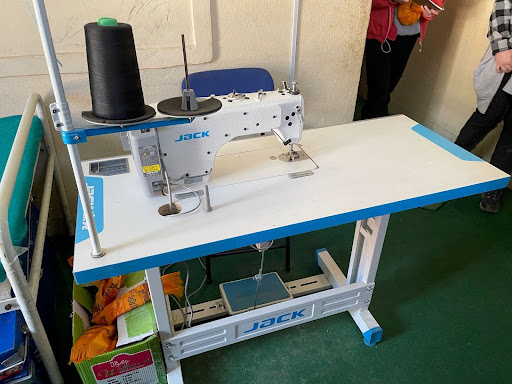
When we visited Kalika High School, the results from the work put in by Nepal SEEDS and the Girl’s Club were evident. Looking around the school and meeting some of the students, there were many more girls than I had anticipated. When talking to the teachers at Kalika, they explained how the number of girls in their school has increased over the past few years. Currently, all of grade 10 at Kalika are all girls except for one boy. This is a significant contrast to most schools in Nepal, which consist mainly of boys.
During the trip, I had the opportunity to ask KP Kafle why girls’ education specifically is the main focus of his work. He explained that in order to enrich and strengthen a country, we need educated women. When women in households are educated, it promotes a cycle of generational education as they have the ability to pass down their knowledge to their children and promote their education. It is the key factor in the development of a country. When a country has educated women, we see economic benefits, political stability, and social transformation. Investing in women’s education is a win for both women and the nation.
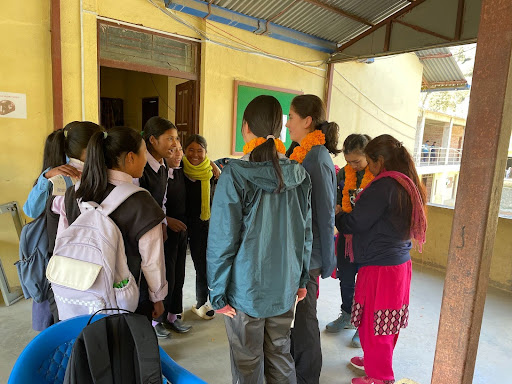
(Dr. Patricia Pomroy)
Menstrual products play an inconspicuous yet crucial role in women’s lives that most of us take for granted. Access to menstrual products allows women to control their own decisions, lives, and success. With multiple ongoing wars, women in warring countries are facing a new level of period poverty that is at a much larger scale than one can imagine. Above facing the atrocities of the war, girls and women who live in these terrible conditions also have to endure long-lasting, negative impacts from the absence of all hygiene products. It is an issue that is overlooked even though 500 million girls are being affected by it. I believe that we, people who have access to menstrual products, need to be the ones to speak up.


